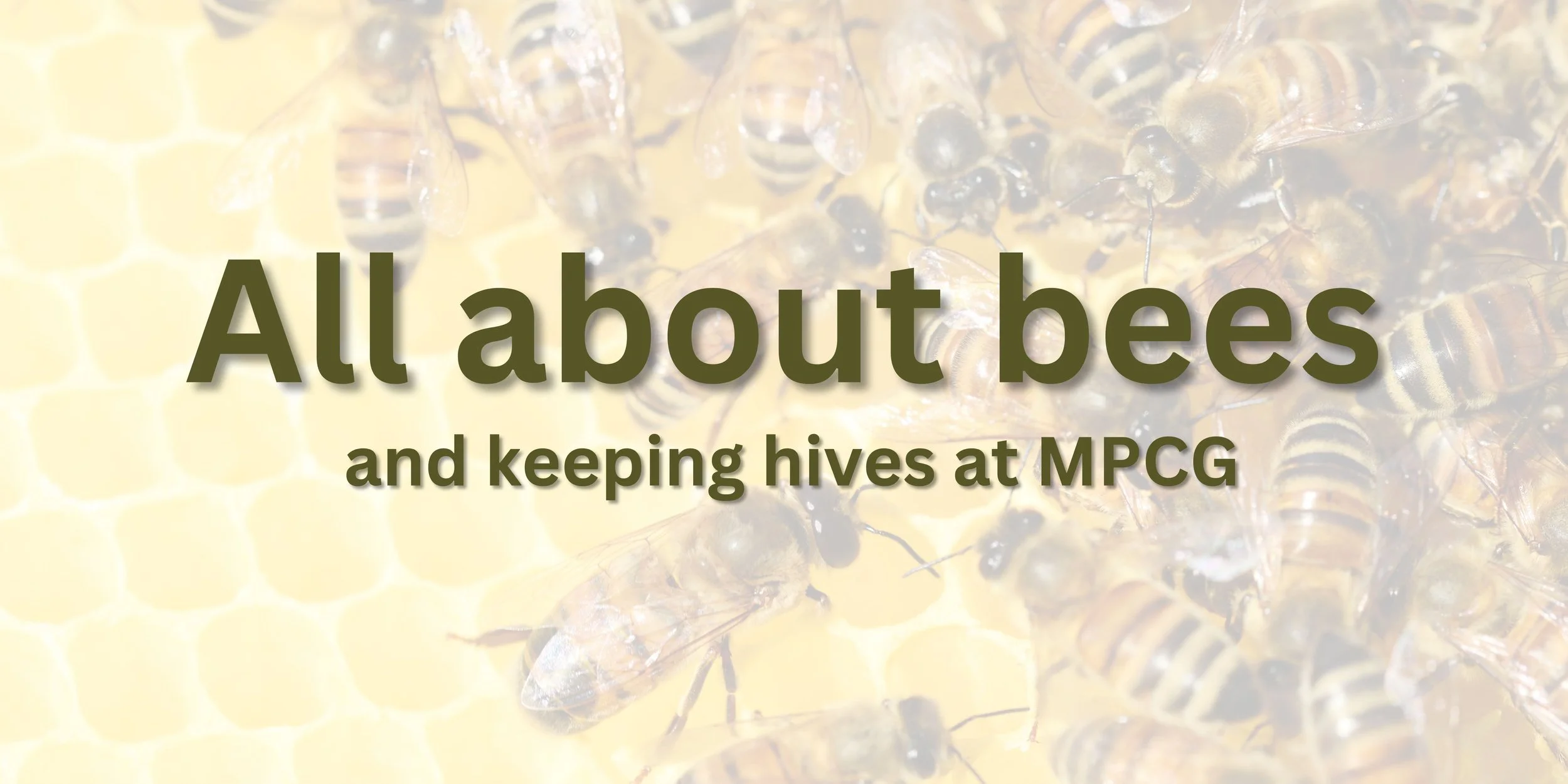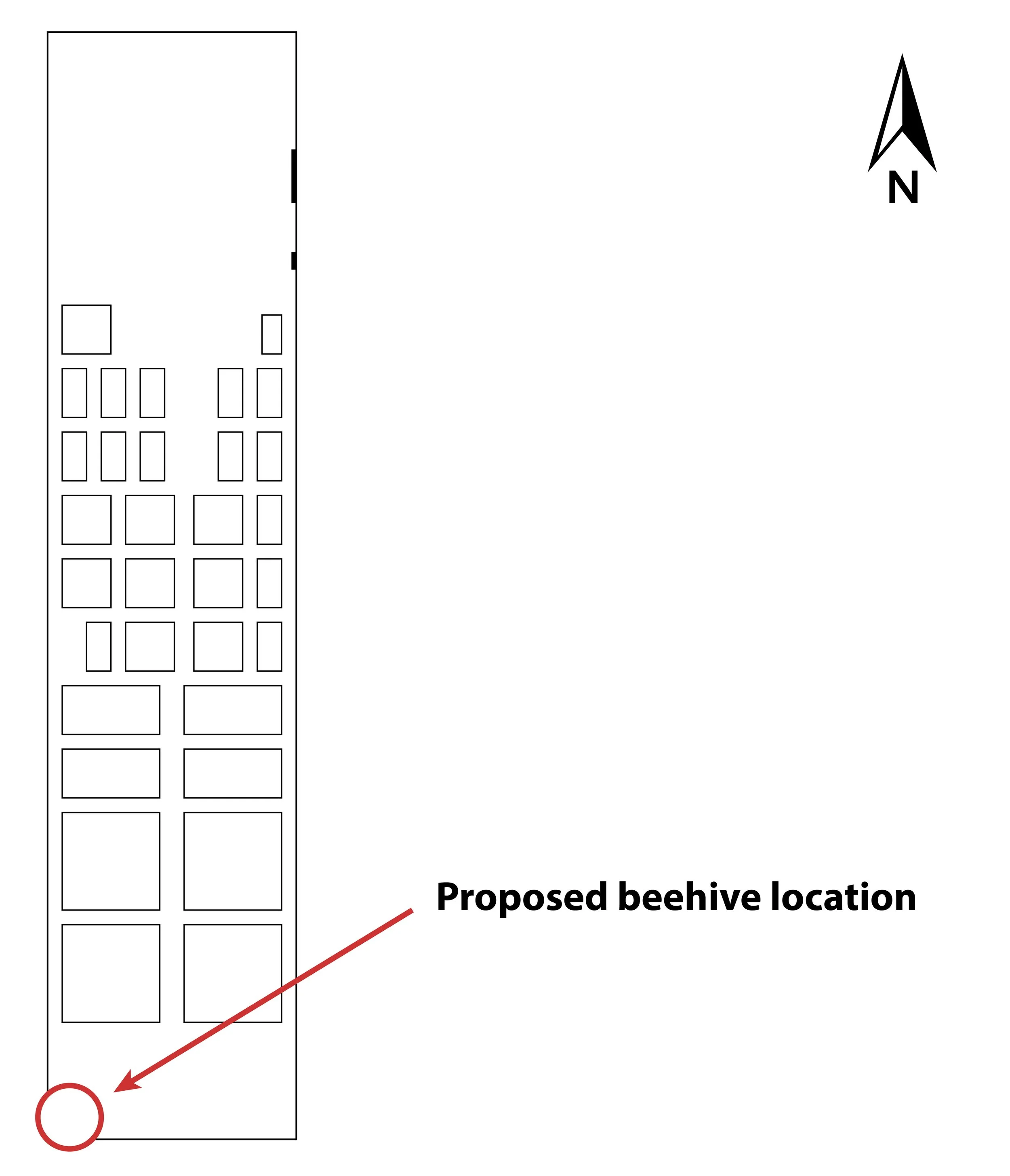Beehives at Mounds Park Community Garden
At Mounds Park Community Garden, we're exploring an exciting opportunity to introduce bee hives to our shared space. This project represents more than just adding pollinators - it's about building community, supporting environmental sustainability, and creating a living ecosystem within our garden.
Project origins:
The bee hive project began when Jennifer Radtke, an experienced beekeeper with 20 years of expertise, joined our garden community. Her presence transformed a long-discussed idea into a potential reality. With declining bee populations and the critical role pollinators play in our ecosystem, we saw an opportunity to make a meaningful environmental impact.
What to expect with beehives
Contrary to common fears, bee hives are not dangerous zones. Honey bees are generally gentle creatures focused on their work. Approximately 75% of bees remain inside the hive, with only 25% foraging. They'll primarily fly 30-50 feet high, often heading to nearby trees and flowering plants, not hovering around gardeners.
Our carefully planned steps
We've strategically designed these steps to ensure transparency, safety, and community consensus. By checking feasibility first and getting member input before significant investment, we're being responsible stewards of our garden's resources and community desires. They are as follows:
Hearing from garden members about wanting hives in the garden
Identify a qualified beekeeper within our garden community (Jennifer Radtke)
Present the initial concept to the Steering Committee for review/approval
After approval from Steering Committee, meet with Jennifer on-site to:
Scout potential hive locations
Discuss volunteer recruitment
Develop a sustainable care plan for the bees
Propose the project to garden members
Host an informational session to educate and address concerns
Post recap blog of the informational session with plan layout and answers to questions raised
Conduct an anonymous member vote to gauge community support
If the vote is positive, notify and seek approval from neighbors within 100 feet of proposed hive location
Obtain 75% neighbor consent before proceeding
If positive, prepare comprehensive proposal to Saint Paul Parks Dept. including
Detailed plans
Volunteer management strategy
Community impact assessment
If approved, pay required $85 application fee
This methodical approach ensures we're transparent, inclusive, and responsible in exploring this exciting project.
Current status
We've completed our informational meeting, where Jennifer shared her expertise. Members have received voting information, and we're collecting anonymous votes to determine the project's next phase.
Potential outcomes
Majority Vote Yes: We'll proceed to neighbor notification and city approval
Majority Vote No: The project will not move forward
Proposed location of the beehive
If approved, the hives will be located in the far southwest corner of the garden within a tall, sturdy barrier. See image:
FAQ
Q: When is the voting deadline?
A: Voting will close on Tuesday, April 29. We encourage all plot holders to participate.
Q: How will the decision to move forward with the hive project be made?
A: As follows:
A simple majority of votes will decide whether we move forward with the project.
We would love to hear from every plot holder, and we’re offering several ways for folks to cast their vote.
Just like in any vote, some people may choose not to participate—and we fully respect that choice.
Q: Will you share the results of the vote?
A: We will share the results.
Q: Are you considering different locations for the hives? (i.e., outside the garden, the tennis courts)
A: We are not considering locations outside the garden.
Q: Are bees dangerous?
A: Honey bees are generally gentle. They sting only as a last resort and die after stinging, so they're motivated to avoid conflict.
Q: How close will the hives be to garden activities?
A: We're considering the southwest corner, approximately 30 feet from active garden spaces, following city guidelines and best practices.
Q: Who will manage the hives?
A: Jennifer Radtke has offered to be our primary beekeeper, with plans to train 2-3 garden members to assist. (More volunteers are welcome!)
Q: What if someone gets stung by a bee? Are there legal concerns for liability? What if you get sued?
A: The garden has liability insurance, which is a requirement for our lease. That said, it’s important to understand how liability works in a case like this. In order for a lawsuit to succeed, the plaintiff would have to demonstrate that the garden or its members acted negligently — that someone failed to exercise reasonable care, and that this failure directly caused an injury. On top of that, they would need to prove that the sting definitively came from a hive maintained at the garden, which is extremely difficult given the presence of wild pollinators throughout our garden and neighborhood.
Additionally, we’re not doing this in a vacuum. The St. Paul Parks Department — which oversees the land and permits for beekeeping — is known for being cautious, thoughtful, and thorough. We are carefully aligning our efforts with their standards and requirements.
Q: What about honey production?
A: Initial hives will focus on establishing the colony. Potential honey harvesting would occur in subsequent years, likely as a community event.
Q: What about allergies and safety?
A: We're committed to clear signage, proper hive management, and creating barriers to minimize risk.
Q: Where’s the data and information on laws governing this process?
A: We are following the guidelines set out by the Saint Paul Parks Department for organizations seeking to install beehives on park property. Our proposal is being shaped according to their requirements, which are publicly available on their website. We are not required to gather or share additional data or legal research beyond what is outlined in their materials. That said, anyone is welcome to conduct further research if they feel it would help them make a more informed decision.
Q: How can anyone be expected to vote without the information upon which to make a rational, wise choice?
A: We’ve been working to provide as much information as possible and have shared details across several platforms. Our beekeeper partner, Jennifer, has generously offered to answer questions directly and is a great resource if you or anyone else wants more in-depth information. We recognize that for some people, no amount of information will feel sufficient — and that’s okay. Our responsibility is to provide accurate, accessible information up to a point of due diligence, and beyond that, we encourage members to explore the topic further on their own if needed.
Q: This feels rushed. What’s the hurry?
A: We’re not rushing. We’ve established a thoughtful process, and we’re moving forward in a way that reflects responsibility and care. That said, we are also mindful of momentum. Proposals like this can easily get stalled when overburdened by too many meetings or prolonged deliberation. Our goal is to keep things moving, while also being respectful of differing opinions. We understand that this pace may feel too fast for those hoping the project won’t proceed, but we’re making space for feedback, and we are being deliberate.
Q: Should there be a face-to-face meeting before the vote?
We understand the value of direct dialogue. But we’ve chosen not to schedule an in-person meeting for this particular issue. The topic has sparked strong feelings, and we want to avoid situations where conversations could easily become emotionally charged or unproductive. That said, members are certainly welcome to organize their own informal gatherings if they wish to discuss this further in person. We’re not avoiding engagement — we’ve intentionally created several opportunities for members to provide input in ways that keep the conversation respectful and constructive.
Q: Is a simple majority vote appropriate for this type of decision?
A: Yes, a simple majority vote is the standard decision-making process for issues affecting our garden. This ensures every member has an equal say. However, with this vote, we can say a clear consensus has been established at this time with the “yes” votes at 80% and the “no” votes at 20%.
Q: Why aren’t individual members encouraged to keep bees in their own backyards instead?
A: That’s a great point — and we do encourage people to support pollinators at home if they can! What happens on someone’s personal property is ultimately up to them. The garden, however, is a shared space, and its management is within our collective purview. When some of our members expressed interest in beekeeping at the garden, and when the opportunity arose to partner with a beekeeper, we decided to explore it further as a community project.
Moving forward
We want to gently remind everyone that our garden community was built on a foundation of kindness, respect, and generosity. The idea that this process is being rushed or conducted without care simply does not reflect the intentional and collaborative approach we’ve taken so far. We are moving forward with deliberation and due diligence, and always with the wellbeing of our community in mind.
Watch for voting results and further communication on our Facebook page and in your email inboxes. Your input matters. If you have further questions, contact us. We're committed to a transparent, inclusive process. Stay curious, stay informed, and let's continue growing together!

